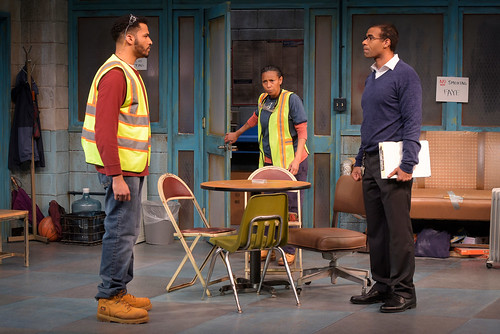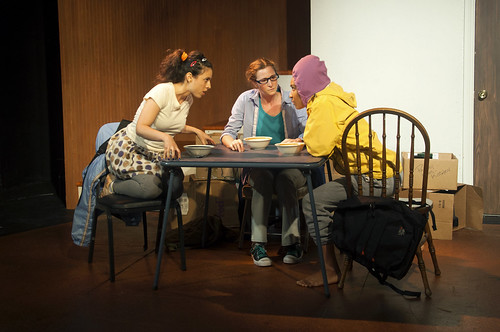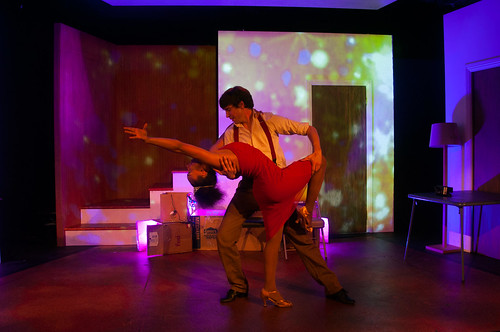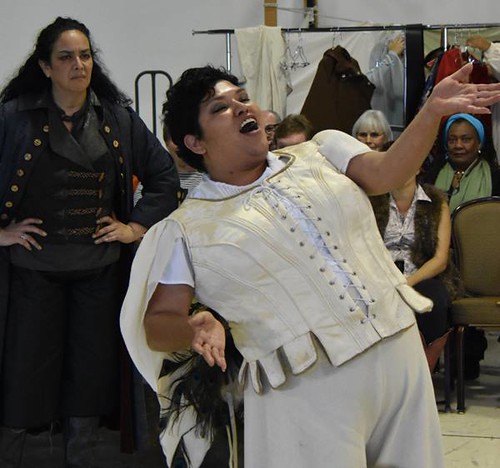
Catherine Castellanos (left) is Prospero and Amy Lizardo is Ariel in California Shakespeare Theater’s All the Bay’s a Stage tour of The Tempest. Below: Patrick Kelly Jones (lower left) is Stephano and John R. Lewis is Caliban. Photos by Jay Yamada
On a day when terrible things were happening in the world, being immersed in William Shakespeare’s The Tempest was sweet balm, especially as performed by the fine actors of California Shakespeare Theater’s “All the World’s a Stage” tour of the show, which, in classic traveling players mode, is being performed in senior centers, homeless shelters, federal prison, rehab centers and the like. It’s hard not to agree with Caliban when he says, “Hell is empty. All the devils are here.” But dark notions of revenge, which so inform the play itself, are soothed by virtue, and Prospero’s exquisite speech, “We are such stuff as dreams are made on, and our little life is rounded with a sleep,” is practically heartbreaking in its beauty.
Director Rebecca Novick’s fine-tuned production has a handful of public performances at the Oakland Museum of California in a space generally used as the museum’s cafe. There’s not lighting, save what’s already in the ceiling. The audience is cozily set up in four sections around a central performance space, and the two-hour production unfurls at a spritely pace, outfitted in lovely designs by Naomi Arnst that assist in differentiating the double-, sometimes triple-cast actors.
What set there is by Nina Ball is clever. A ship-shaped crescent is instrumental in conveying the play-opening storm that leads to a violent shipwreck. Then, as the action shifts to the island home of the wizardly Prospero, that crescent is turned upright, set in a cradle and serves as a throne of sorts, a point of power for the island’s master, or, in this case, mistress as Propsero is played by the commanding Catherine Castellanos. The pole that had served as the ship’s mast, is relocated to a tuft of grass and is climbed upon by the fairy Ariel (Amy Lizardo), or serves as a doorway through which we glimpse the newly smitten lovers Miranda (Tristan Cunningham) and Ferdinand (Rafael Jordan) staring googly-eyed at each other and arm wrestling.
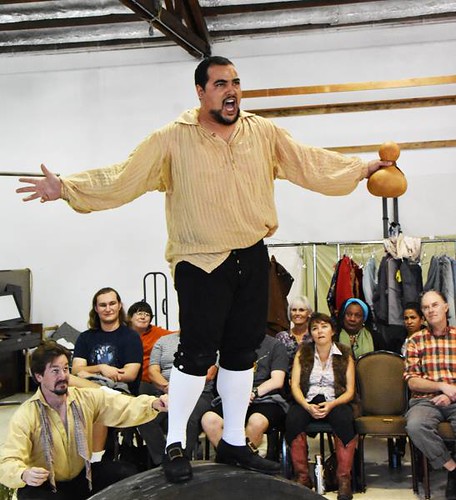
This is stripped-down theater at its best: words and performance, story and emotion. What I will take away from this enlivened production, aside from yet another reminder of how profound Shakespeare can be at acknowledging the darkness in the world while holding on to hope and faith in love and our better nature, are the magic of Castellanos in performance, the thrill of watching Cunningham and and Jordan convincingly fall in love in an instant and the genuine comic inspiration of the show’s clowns.
Cunningham doffs her maiden’s weeds to become Trinculo, a buffoonish steward from the wrecked ship, Patrick Kelly Jones is Stephano and John R. Lewis is Caliban, and the three of them, as they pass the tippling gourd, are outright hilarious. Sometimes the shift from the revenge plot (Prospero lands all her enemies on the island to wreak revenge) to the clowning makes me cringe. But in this production I actively looked forward to it. At one point, Cunningham came into the audience, plopped into the chair next to me and put her arm around me for much of one scene. Now that’s audience interaction I can get behind.
The revenge plot is also quite satisfying thanks to Liam Vincent as Antonio, Prospero’s dastardly, throne-stealing brother, Jones as the ruthlessly ambitious Sebastian and Lewis as the grieving king (he believes his son was drowned in the storm). Also in their company but not part of any murderous plots is Gonzalo, here played as pregnant woman by Carla Pantoja. There’s lots of strong female power on this island, and Pantoja’s Gonzalo is a powerful part of it.
Lizardo’s Ariel sings like an angel (accompanied by composer/musical director Olive Mitra on upright bass and a variety of percussion), and Kelly’s Stephano sings scurvy tunes like a natural-born sailor.
Castellanos ends the show with a powerful, emotional reading of Prospero’s famous speech, but the way she delivers it to the audience, all seemingly delighted by the two hours they’ve just spent together, feels intimate and personal, like she’s talking just to us and not over hundreds of years and thousands of productions of The Tempest. Again, on this day when more terror was causing more mayhem and pain in the world, it was impossible not to be moved by the words.
“Our revels now are ended. These our actors,
As I foretold you, were all spirits and
Are melted into air, into thin air:
And, like the baseless fabric of this vision,
The cloud-capp’d towers, the gorgeous palaces,
The solemn temples, the great globe itself,
Yea, all which it inherit, shall dissolve
And, like this insubstantial pageant faded,
Leave not a rack behind. We are such stuff
As dreams are made on, and our little life
Is rounded with a sleep.”
FOR MORE INFORMATION
California Shakespeare Theater’s All the Bay’s a Stage tour of The Tempest has a limited number of public performances through Nov. 22 at the Oakland Museum of California, 1000 Oak St., Oakland. Tickets are $20. Call 510-548l-9666 or visit www.calshakes.org.
